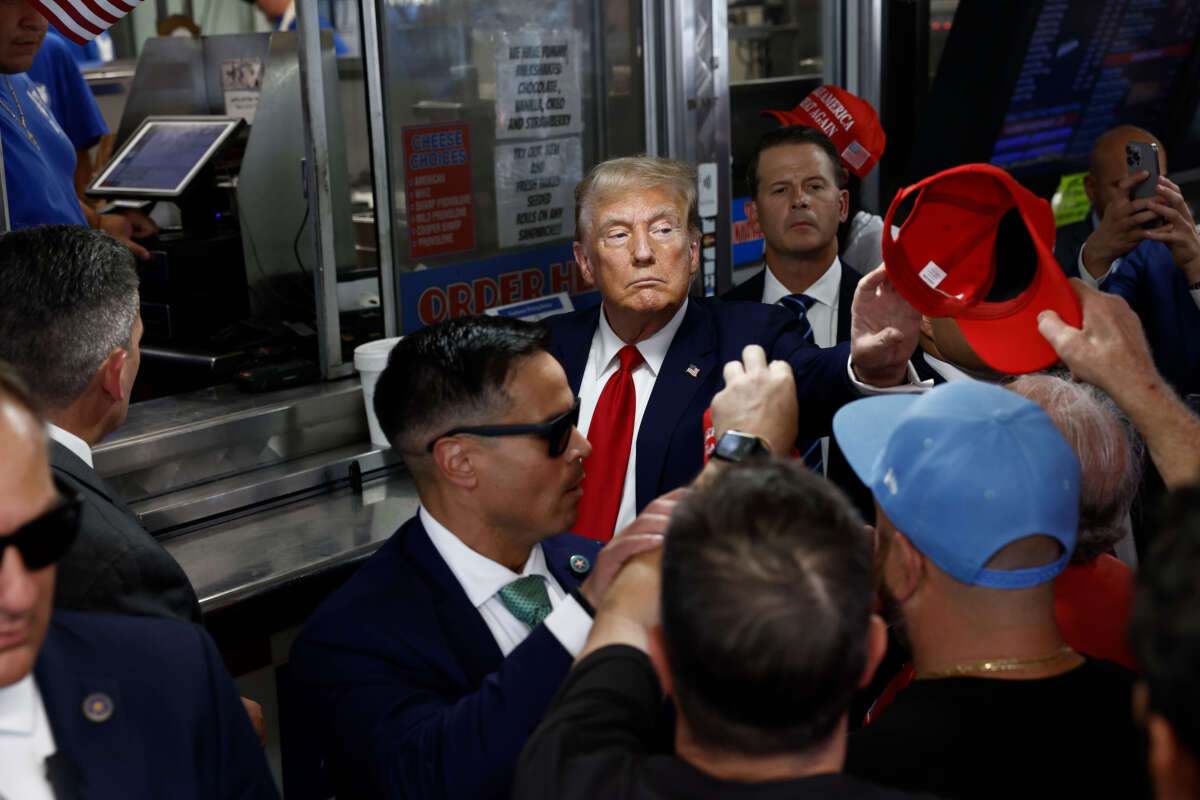Truthout is an indispensable resource for activists, movement leaders and workers everywhere. Please make this work possible with a quick donation.
Over a dozen former winners of the Nobel Prize for economics have signed on to an open letter warning that, should former President Donald Trump win the presidential election this fall, his policies as president would likely lead to a global inflationary crisis.
Prices on goods rose significantly following the end of pandemic lockdowns, as the economy jumpstarted and demand for items went up. Although inflation has since cooled down, many Americans are still struggling to make ends meet.
The issue is hurting President Joe Biden in the polls — but 16 Nobel prize winners believe the economy would be much worse over the next four years under a Trump presidency, according to reporting from Axios.
“While each of us has different views on the particulars of various economic policies, we all agree that Joe Biden’s economic agenda is vastly superior to Donald Trump,” the letter from the Nobel laureates states, adding:
We believe that a second Trump term would have a negative impact on the U.S.’s economic standing in the world, and a destabilizing effect on the U.S.’s domestic economy.
“Many Americans are concerned about inflation,” the letter-writers recognized, but “there is rightly a worry that Donald Trump will reignite this inflation, with his fiscally irresponsible budgets.”
The letter was organized by Joseph Stiglitz, who won the Nobel Prize in economics in 2001. Other winners who signed onto the letter include George A. Akerlof (2001), Angus Deaton (2015), Claudia Goldin (2023), Oliver Hart (2016), Eric S. Maskin (2007), Daniel L. McFadden (2000), Paul R. Milgrom (2020), Roger B. Myerson (2007), Edmund S. Phelps (2006), Paul M. Romer (2018), Alvin E. Roth (2012), William F. Sharpe (1990), Robert J. Shiller (2013), Christopher A. Sims (2011), and Robert B. Wilson (2020).
The issue of the economy — specifically the rise in prices of consumer goods — will undoubtedly feature prominently in the next several months of the presidential campaign, and will likely be discussed during the debate between Biden and Trump later this week.
According to the latest Economist/YouGov poll, Biden receives poor marks from voters on the economy, with just 38 percent approving of his job performance on the issue and 54 percent giving him a negative score.
There are signs, however, that Biden’s rating on the issue is improving just slightly — a recent Fox News poll, for instance, found that the rate of voters who say they’re “getting ahead” or “holding steady” financially has gone up by 5 points over the past year. While Biden’s approval rating on the economy is still low, the increase could prove significant in an election that will likely be as close as it gets.
Notably, much of the rise in prices over the past couple of years in the U.S. has been due to “greedflation” — companies and their CEOs raising prices on goods simply to get a higher profit or paycheck, rather than any policy or other economic force influencing prices.
Indeed, according to a report from the AFL-CIO in the summer of 2022, CEOs saw a pay raise from the previous year of about 18.2 percent, when prices on goods were skyrocketing supposedly because of inflation. (Comparatively, workers only saw a wage increase of 4.7 percent). Another report from Groundwork Collaborative, published in January of this year, found that 53 cents out of every dollar of inflationary price increases in the last two quarters of 2023 were due to companies seeking to increase corporate profits.
“While corporations were quick to pass on their increased costs to consumers” when some inflation happened, “they are surprisingly less quick to pass on their savings to consumers” when costs went down, said Liz Pancotti, co-author of the report.
A terrifying moment. We appeal for your support.
In the last weeks, we have witnessed an authoritarian assault on communities in Minnesota and across the nation.
The need for truthful, grassroots reporting is urgent at this cataclysmic historical moment. Yet, Trump-aligned billionaires and other allies have taken over many legacy media outlets — the culmination of a decades-long campaign to place control of the narrative into the hands of the political right.
We refuse to let Trump’s blatant propaganda machine go unchecked. Untethered to corporate ownership or advertisers, Truthout remains fearless in our reporting and our determination to use journalism as a tool for justice.
But we need your help just to fund our basic expenses. Over 80 percent of Truthout’s funding comes from small individual donations from our community of readers, and over a third of our total budget is supported by recurring monthly donors.
Truthout has launched a fundraiser to add 379 new monthly donors in the next 6 days. Whether you can make a small monthly donation or a larger one-time gift, Truthout only works with your support.
